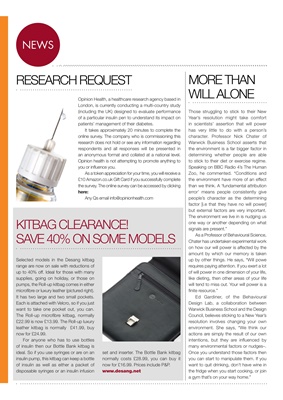
NEWS
Diabetes Research
Desang Diabetes Kitbag Clearance
MORE THAN
WILL ALONE
Those struggling to stick to their New
Year's resolution might take comfort
in scientists' assertion that will power
has very little to do with a person's
character. Professor Nick Chater of
Warwick Business School asserts that
the environment is a far bigger factor in
determining whether people are able
to stick to their diet or exercise regime.
Speaking on BBC Radio 4's The Human
Zoo, he commented. "Conditions and
the environment have more of an effect
than we think. A 'fundamental attribution
error' means people consistently give
people's character as the determining
factor [i.e that they have no will power]
but external factors are very important.
The environment we live in is nudging us
one way or another depending on what
signals are present."
As a Professor of Behavioural Science,
Chater has undertaken experimental work
on how our will power is affected by the
amount by which our memory is taken
up by other things. He says, "Will powe
requires paying attention. If you exert a lot
of will power in one dimension of your life,
like dieting, then other areas of your life
will tend to miss out. Your will power is a
finite resource."
Ed Gardiner, of the Behavioural
Design Lab, a collaboration between
Warwick Business School and the Design
Council, believes sticking to a New Year's
resolution involves changing your own
environment. She says, "We think our
actions are simply the result of our own
intentions, but they are influenced by
many environmental factors or nudges-.
Once you understand those factors then
you can start to manipulate them. If you
want to quit drinking, don't have wine in
the fridge when you start cooking, or join
a gym that's on your way home."